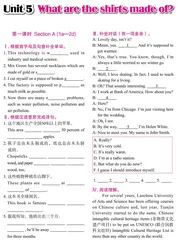Unit 5What are the shirts made of?

第一课时 Section A (1a—2d)
Ⅰ. 根据首字母及句意补全单词。
1.This technology is w used in industry and medical science.
2.Mrs Green has several necklaces which are made of gold or s .
3.I cut myself on a piece of broken g .
4.The factory is supposed to p as much milk as possible.
5.Now there are many e problems, such as water pollution, noise pollution and air pollution.
Ⅱ. 根据汉语意思完成译句。
1.这个地区生产全国50%以上的苹果。
This area 50 percent of apples.
2.筷子是由木头制成的,纸也是由木头制成的。
Chopsticks wood, and paper wood, too.
3.这些植物种植在山脚下。
These plants are at
of .
4.这本书全球闻名。
This book is famous
.
5.据我所知,他将出差三个月。
, he’ll be away for three months.
Ⅲ. 补全对话(有一项多余)。
A: Lovely day, isn’t it?
B:Mmm, yes. 1 And it’s supposed to get warmer.
A:Yes, that’s true. You know, though, I’m always a little worried to see winter go.
B: 2
A:Well, I love skating. In fact, I used to teach skating for a living.
B: Oh? That sounds interesting. 3
A:I work at Bank of America. How about you?
B: 4
A: Here?
B:No, I’m from Chicago. I’m just visiting here for the wedding.
A: Oh, I see.
B: By the way, 5 I’m Helen White.
A: Nice to meet you. My name is John Smith.
A. Really?
B. It’s very cold.
C. It’s really warm.
D. I’m at a radio station.
E. But what do you do now?
F. I guess I should introduce myself.
1. 2. 3. 4. 5.
Ⅳ. 阅读理解。
For several years, Lanzhou University of Arts and Science has been offering courses on Chinese culture and, last year, Tianjin University started to do the same. Chinese intangible cultural heritage items (非物质文化遗产项目) to be put on UNESCO (联合国教科文组织) Intangible Cultural Heritage List is more than any other country in the world.
As a foreigner, I’m a lover of Chinese culture. Several years ago, I visited a small village near Suzhou where teenage girls were learning the traditional art of embroidery
(刺绣). For centuries, Suzhou has been known for its wonderful embroidery. Young girls there learn the art from an early age. I watched these “modern” girls working for a while. One of the girls just completed a piece of work. I bought it as a gift for my brother and his wife, and it now hangs proudly in the living room of their home in Canada.
What makes both Chinese and foreigners love embroidery so much? The work shows the beauty of Chinese culture and the great skills of craftsmen (工匠). It may appear simple, but in fact it’s the result of years of hard work. As one Chinese opera performer said, “One minute of performance on stage takes ten years of hard work off stage.”
I doubt that the students who study Chinese culture in college will become true masters, but they will get a better understanding of the importance of Chinese culture and, hopefully, keep that culture alive.
1.What did Tianjin University do last year?
A. It offered help to UNESCO.
B. It offered courses on Chinese culture.
C.It made a list of intangible cultural heritage items.
D.It spread Chinese culture with another university.
2.What can we learn from the writer’s experience of visiting the village?
A. Most young people like embroidery.
B. He pays attention to Chinese history.
C. He knows some embroidery skills.
D. Some foreigners love embroidery.
3.Both Chinese and foreigners like embroidery probably due to _____.
A. Its symbol. B. Its skills.
C. Its color. D. Its craftsmen.
4.What is the writer’s attitude towards lessons on Chinese culture?
A. Hopeful. B. Doubtful.
C. Uncaring. D. Worried.
第二课时 Section A (3a—4c)
Ⅰ. 用方框中所给词(组)的适当形式填空。
avoid even though local
no matter produce
1.Bill will come on time it rains.
2.Tom has been me all week.
3.The new house was the of two years’ hard work.
4.I’m going on a picnic tomorrow what the weather will be like.
5.Excuse me, sir. Do you live ?
Ⅱ. 按要求完成句子。
1.This model plane is made of wood and steel. (对画线部分提问)
2.Jim went to Italy on his vacation. (对画线部分提问)
3.I saw him under the tree yesterday. He was making a clay piece. (合并为一句)
4.The general sent hot-air balloons out to ask for help. (对画线部分提问)
5.White snow covered everything yesterday. (改为被动句)
Ⅲ. 完形填空。
My dad taught me the power of language when I was young.
It 1 when I was eight. As a kid, I was always climbing trees. So it was no 2 for my dad to find me at the top of a 30-foot tree. I didn’t realize a branch (树枝) could break or I could get hurt. I just thought it was 3 to be up so high.
My elder cousin, Tammy, was in the